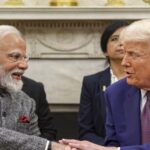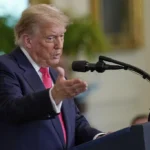
Key Highlights:
- India reaffirms its opposition to China’s Belt and Road Initiative (BRI) at the Shanghai Cooperation Organisation (SCO) summit.
- Pakistan’s Prime Minister Shehbaz Sharif urges SCO members to avoid a “narrow political prism” and support regional connectivity projects like BRI and CPEC.
- India remains the only SCO member state to oppose BRI, citing concerns over territorial integrity and the debt burden of such initiatives.
India’s Stance on BRI
India once again stood firm in its opposition to China’s Belt and Road Initiative (BRI) during the recent SCO summit. External Affairs Minister S. Jaishankar emphasized India’s position, highlighting the importance of sovereignty and territorial integrity in trade and connectivity initiatives. India’s key objection to the BRI stems from the China-Pakistan Economic Corridor (CPEC), which passes through Pakistan-occupied Kashmir (PoK), a region that India claims as its own. By running through this disputed territory, India views CPEC as a violation of its territorial integrity.
Jaishankar also raised concerns about the debt implications of projects like the BRI, echoing global criticisms of China’s infrastructure projects leading to debt dependency in developing nations. While acknowledging the benefits of collaborative connectivity, he stressed that such initiatives should not come at the cost of national sovereignty or impose long-term financial burdens.
Pakistan’s Response: A Call for Cooperation
In contrast to India’s position, Pakistani Prime Minister Shehbaz Sharif called for a broader, more cooperative approach to regional connectivity. Sharif urged SCO members to avoid viewing initiatives like BRI and CPEC through a “narrow political prism,” instead emphasizing the socio-economic benefits these projects could bring to the entire region.
Sharif highlighted Afghanistan’s potential as a hub for regional trade and transit and stressed the need for peace and stability in the region. He further expressed optimism about the role that projects like BRI could play in boosting regional connectivity, economic integration, and progress within the SCO framework.
Geopolitical Tensions at the SCO Summit
India’s dissent on BRI stood in contrast to the unified support from other SCO member states, including Russia, China, Pakistan, and Central Asian countries, which reaffirmed their commitment to the Chinese initiative. The final communique from the summit praised ongoing efforts to link the Eurasian Economic Union with the BRI and expressed optimism about implementing the SCO Economic Development Strategy through 2030.
This disagreement underscores the growing geopolitical divide between India and China, as well as their respective allies within the region. While the BRI continues to gain traction among SCO member states, India remains steadfast in protecting its territorial integrity and guarding against potential economic risks associated with the initiative.
Broader Regional Issues
Beyond connectivity debates, the summit also touched on pressing regional issues. Pakistan’s Prime Minister Shehbaz Sharif addressed the ongoing Gaza crisis, condemning Israeli attacks and calling for an immediate ceasefire. He also emphasized the need for a peaceful resolution in Afghanistan, urging the Taliban to prevent the use of Afghan territory for terrorism against its neighbors, reflecting the shared security concerns of SCO member states.
Conclusion
India’s opposition to China’s Belt and Road Initiative continues to highlight the geopolitical complexities within the SCO. As Pakistan pushes for greater regional cooperation through BRI and CPEC, India remains focused on safeguarding its sovereignty and economic interests, particularly regarding the China-Pakistan Economic Corridor in PoK. The outcome of these differing approaches will likely shape the future of connectivity and cooperation in the region.




































Leave a Reply